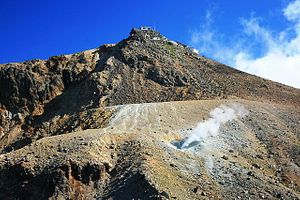While Japan is dotted with volcanoes and well acquainted with seismic activity, the eruption that occurred on Saturday at Mount Ontake, straddling the border of Nagano and Gifu prefectures, was both unexpected and incredibly untimely. The volcano had not seriously erupted since 1979, with no recorded deaths in modern times. However, the eruption occurred on a Saturday just before noon, when many people were out enjoying an early fall hike. A report from the Associated Press indicates that when it happened, at least 250 people were near the 3,067 meter summit, Japan’s second tallest volcano.
While no magma has been discovered as part of the eruption, gas, ash and rocks were ejected, which rained down until early afternoon. The Japan Times reported that more than 230 hikers were forced to stay on the mountain overnight in lodges due to poor visibility. Many had to huddle in the bottom floors or basements covering their heads with helmets or pots to protect themselves from the large rocks that were falling through the ceilings. It appears that those who were able to find shelter in mountainside lodges and shelters survived, while the Jiji Press reported that around 40 people had been injured by the time they descended the volcano.
The rescue operation is still ongoing, but 31 people are believed to have died, with 12 bodies having been brought down by firefighters and members of the Japan Self-Defense Forces, with another 19 still near the summit. So far the press is describing the victims as in a state of “cardiac arrest” due to gas and ash, the term is being used until medical staff can confirm their status. Rescue efforts were called off on Sunday afternoon at 1:30 as both the ash and toxic gas were still billowing forth from Mount Ontake. The effort is a coordination of both prefectures’ police forces, as well as their fire departments and the JSDF, totaling at least 550 personnel.
A large-scale eruption is not expected at this time, although smaller eruptions are expected to continue. The Coordinating Committee for Prediction of Volcanic Eruptions said it believes magma was not part of the eruption, and that it was caused by an interaction of groundwater and magma below the volcano’s surface. The committee added that it does not expect a “major magmatic eruption,” as there are “no signs of crustal deformities caused by magma rising through a volcanic vent.”
The Asahi Shimbun reported that the Meteorological Agency provided the local municipalities with recent volcanic activity, as “the number of volcanic earthquakes around the volcano increased on Sept. 10 and 11, and low-frequency tremors were recorded starting Sept. 14.” However, the activity later declined, and the agency did not raise its advisory warning because the indicators were minor compared to a 2007 eruption. Speaking with the Asahi Shimbun, University of Tokyo’s professor emeritus Toshitsugu Fujii, who heads the committee, said “While it is essentially impossible for us to predict volcanic activities with 100-percent accuracy, we should have provided information in a way to send a more proper warning,” Fujii said. “There is also room for improvement in how we raise the volcano warning levels.”
Despite Japan’s 110 active volcanoes, fatal eruptions have become less common, with the last one occurring in 1991 when 43 people died near Mount Unzendake on Japan’s southern island of Kyushu. The ability to detect and predict volcanic activity has improved over the last several decades, with the Geological Survey of Japan serving as one of the world’s top three institutions on the subject. Nonetheless, many Japanese still feel a strong sense of helplessness in the face of the devastating natural forces to which the country is prone.































